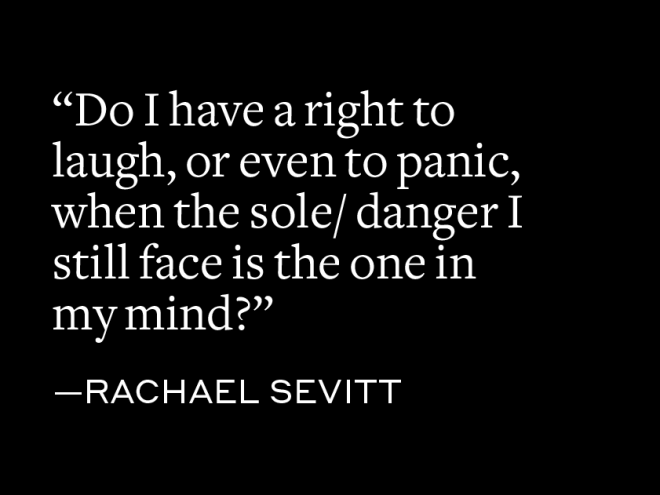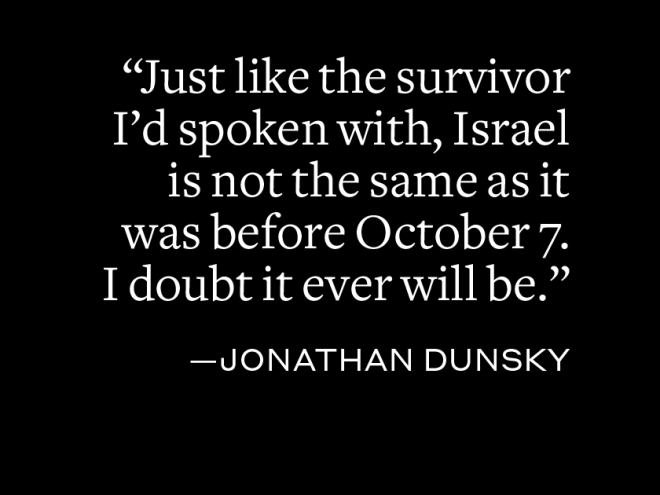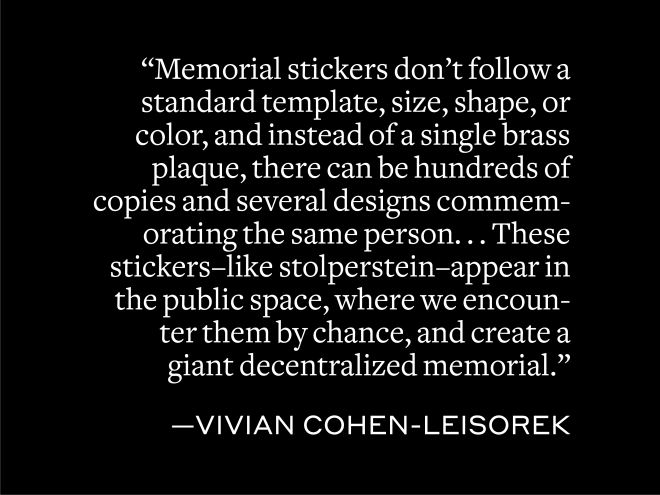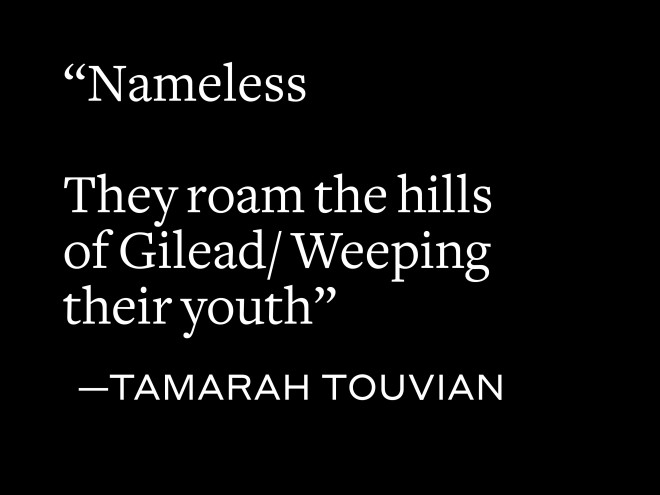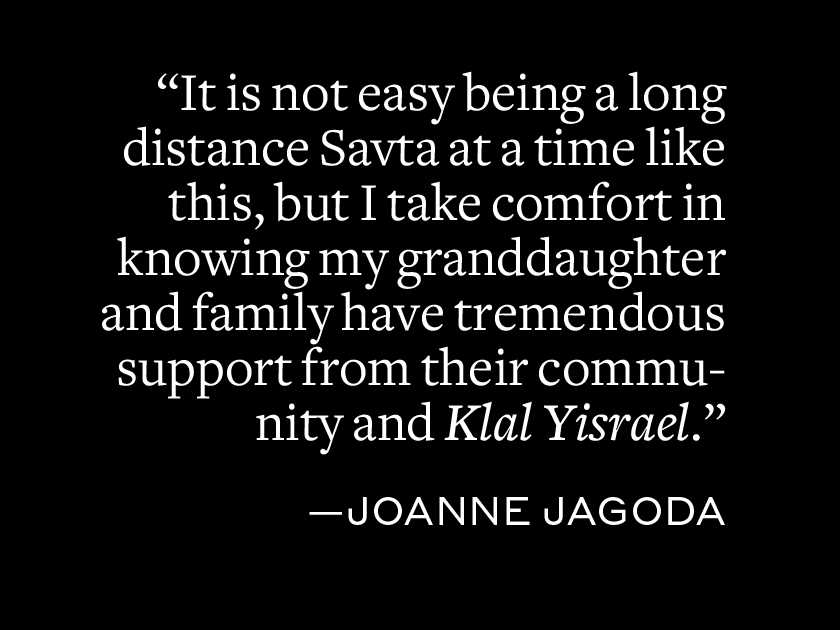
This piece is part of our Witnessing series, which shares pieces from Israeli authors and authors in Israel, as well as the experiences of Jewish writers around the globe in the aftermath of October 7th.
It is critical to understand history not just through the books that will be written later, but also through the first-hand testimonies and real-time accounting of events as they occur. At Jewish Book Council, we understand the value of these written testimonials and of sharing these individual experiences. It’s more important now than ever to give space to these voices and narratives.
When the phone rang in the afternoon in California in November of 2024 and I heard my daughter’s voice, I knew instantly something was wrong. My kids live in Israel, and I know when they normally call me and it is never in the middle of an afternoon. I used to keep a clock in my kitchen with the time in Israel, ten hours ahead of us in California. When my oldest child and her husband decided to make Aliyah, twenty-three years ago, I can’t say I was thrilled. In a way I blamed myself. I had encouraged her to do a summer program in Israel and she went on to do a year of college there as well. I had done such a good job of fostering her connection to Israel that she found soul there, particularly in Jerusalem. Her husband, also born in California, similarly needed to be in the Holy Land. They are modern Orthodox and their life in Israel affords them the Jewish spiritual sustenance that no other place on earth could give them.
I have learned to be a long distance Savta. One grandchild was born a month early and I had to scramble to get to Israel. For the second, I was already on the plane coming over when she made her appearance. My grandson, the third grandchild and our first boy, took his sweet time and I walked the hot Jerusalem streets in August with my daughter until he finally decided to make his grand entrance. Each of our three is special and what is incredible is that despite only seeing them once or at most twice a year, we feel very close to them since we can text and call them. We do miss attending school events, recitals, and dance shows, but knowing how much they love being in Israel and how special the country is for what it provides for children is our consolation.
When October 7 occurred, I got in touch with my family as soon as I could. For the first time in all the years they lived in Israel, my optimistic and cheerful son in law sounded depressed and somber. This unprecedented brutal attack affected the whole country. Right away my family swung into action to help. My son in law baked challahs every week with a group that sent them to soldiers. My grandson helped with that too. My middle granddaughter assisted in a variety of ways like coordinating a toy drive for displaced children. The oldest granddaughter taught at a hotel school where a whole community from the south was sheltered. My daughter led healing circles and offered her comfort to the neighborhood.
We were incredibly proud when our oldest grandchild, just eighteen, joined the IDF. She has not been in a combat zone (thankfully) but her boyfriend of three years had already done several tours in Gaza and was on the border of Lebanon. It was an afternoon in November when her world, the sheltered life of a nineteen-year old, was turned on its head. She was on the phone with her boyfriend when she heard sirens in the background. He said he would get right back to her, but he didn’t. He never broke his promises, and she knew something was wrong. She called his brother and within a short time learned of his fate. He had been killed by shrapnel. A few hours later, our phone rang in California on that November day and we heard the shocking news about our granddaughter’s boyfriend who had been killed hours earlier.
Thus began our family’s journey with grief and loss, with us in California and our loved ones in Israel. They have had to grapple with what it means to lose a soldier and a loved one in and have seen how the country comes to stand by you. Our granddaughter spoke bravely at the funeral, her father by her side. The shivah, outside her boyfriend’s house, was attended by hundreds — from strangers off the street to army generals. My daughter’s house was also filled for days with friends and neighbors who bought comfort and endless plates of food. School mates of the younger children came to be with them. I ordered pizza for them long distance.
My granddaughter was constantly surrounded by friends. She had met her boyfriend at a youth group for children with special needs, Krembo, where they were both counselors. Working together at Krembo, they became friends and eventually something more. He loved being with our family and spent many shabbats with them. The young couple would cook, get together with friends, laugh, and have the best time. He would always bring my granddaughter flowers before shabbat and sometimes surprised my daughter with them too. Even when he could not get back from the army, my grandson would bring flowers to his sister from her boyfriend who had set it up with him.
One Friday afternoon, shortly after her boyfriend was killed, my granddaughter was photographed at her boyfriend’s grave at Mount Herzl. She was lying on his grave with the flowers she had brought for him, and the photo went viral, seen by thousands across Israel. This image illustrates the tragedy of war and the pain for those who grieve their loved ones. Because of this photo, our granddaughter was asked to appear on several television shows. Her interview on one popular TV show was striking. Even the commentators were crying, devastated by her story but also struck by her courage and uplifting words when she talked about her boyfriend and what he stood for.
I can’t tell you how proud I am of her. Rather than wallow in pity, she started an initiative in memory of her beloved where she has set up a foundation that supplies flowers for soldiers at three bus depots, in Jerusalem, Tel Aviv and now Haifa. It is called The Flower Man. She figured out how to get the flowers from growers, set up the paperwork for the nonprofit, and has a cadre of young people who make the bouquets each week now in the three locations. Her efforts are a way to remember him and his good deeds. With every bouquet the soldiers take home there is a handwritten note, spreading warmth and support around the country.
She has also become a spokesperson for the GFIDF, an organization which helps the girlfriends of fallen soldiers providing counseling and any support they need. She was interviewed by The Jerusalem Post on a podcast about the phenomenal work GFIDF does for these women which has been in existence for a number of years.As soon as a soldier falls, they find out whether the soldier had a partner and find out how they can tailor their support to them and their family. They recognize that the pain of loss is not going to disappear, but lasts a lifetime. The organization has been immensely helpful for my granddaughter.
It is not easy being a long distance Savta at a time like this, but I take comfort in knowing my granddaughter and family have tremendous support from their community and Klal Yisrael.
The views and opinions expressed above are those of the author, based on their observations and experiences.
Support the work of Jewish Book Council and become a member today.
After she retired, it took just one inspiring writing workshop to launch Joanne Jagoda on an unexpected creative writing trajectory. Though she started late, writing became her passion. Her prize-winning poetry, creative non-fiction and short stories appear on-line and in more than sixty print anthologies including Voices for Israel, The Deronda Press, A Poet’s Siddur, Poetica, and Persimmon Tree. She has received three Pushcart nominations, and first place in the Gemini Open poetry competition. Joanne has taken many craft classes, participates in three weekly writing workshops and has collaborated with several notable Bay Area poets.
Joanne’s book, My Runaway Hourglass, (joannejagoda.com), was published in 2020. She has several new chapbooks forthcoming in 2026. Joanne lived in Oakland California for many years where she was a leader in the Jewish community including serving as the first woman president of her Orthodox synagogue. She relocated recently to a vibrant retirement community in Walnut Creek where she goes tapdancing. Her seven grandchildren call her Savta.
